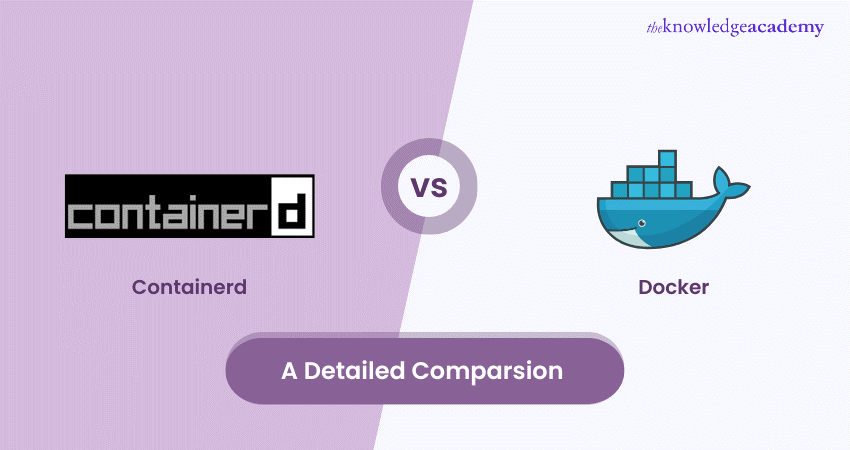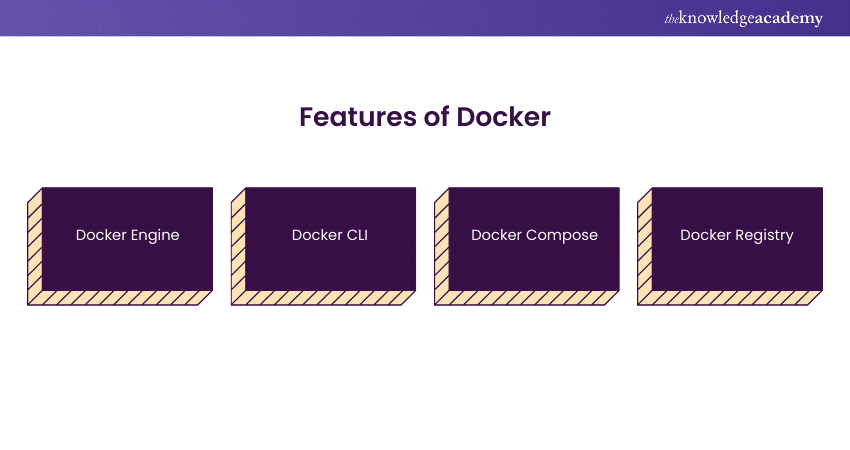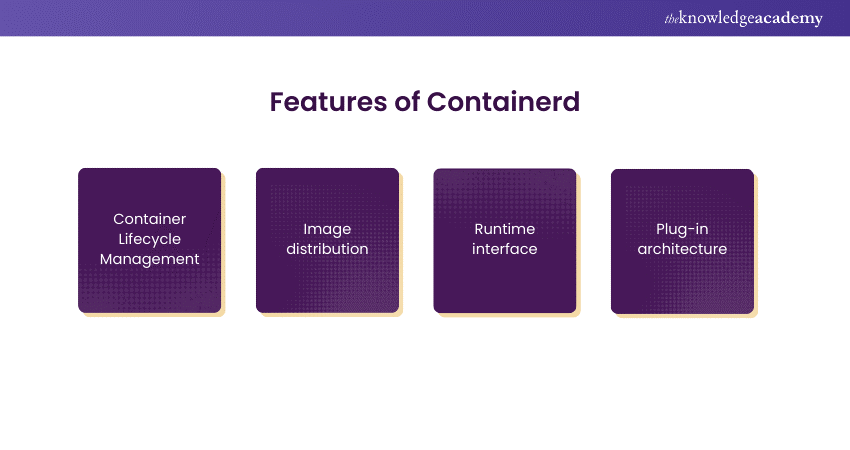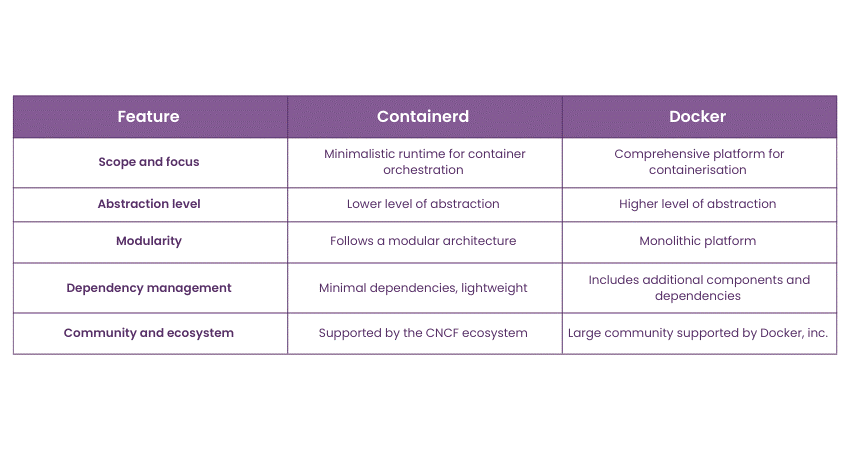We may not have the course you’re looking for. If you enquire or give us a call on +0800 780004 and speak to our training experts, we may still be able to help with your training requirements.
Training Outcomes Within Your Budget!
We ensure quality, budget-alignment, and timely delivery by our expert instructors.

Containerd and Docker are two of the most widely used container platforms. They help developers and operators create, run, and manage applications in isolated environments across various platforms and scenarios. However, Containerd and Docker have different architectures, features, and scopes that suit different use cases and preferences. Therefore, one question is natural to arise: “Containerd vs Docker, which one should you pick?”
In this blog, we will compare Containerd vs Docker in terms of design, functionality, compatibility, performance, and more. We will also highlight the differences between Containerd and Docker and how they affect your application development and deployment. By the end of this blog, you will have a clear understanding of the two platforms and be able to choose the best platform for achieving your application goals.
Table of Contents
1) What is Docker?
2) What is Containerd?
3) Containerd vs Docker: Key differences
4) Similarities between Containerd and Docker
5) Conclusion
What is Docker?
Docker is a popular platform that enables developers to package, distribute, and run container applications within isolated environments. These containers encapsulate all the dependencies and libraries required for the application to run, ensuring consistency across different environments. Docker uses containerisation technology to create lightweight, portable, and self-sufficient units that can run on any infrastructure with Docker support. This approach streamlines the development process by allowing developers to build, test, and deploy applications more efficiently.
Docker simplifies application deployment, improves scalability, and enhances resource utilisation by isolating applications from the underlying infrastructure. With Docker, developers can easily manage and orchestrate complex software environments, making it a valuable tool for modern application development and deployment workflows.
Here are a few key features of Docker:

a) Docker Engine: The Docker Engine is responsible for building, running, and managing containers on a host system. It includes the Docker daemon (Dockerd) and the Docker client (Docker), which interact via a RESTful API.
b) Docker CLI: The Docker Command-Line Interface (CLI) provides a user-friendly interface for interacting with Docker, allowing users to manage containers, images, volumes, and networks.
c) Docker Compose: Docker Compose is a tool for defining and managing multi-container Docker applications using a simple Yet Another Markup Language (YAML) file format. It enables developers to define and deploy complex application architectures with a single command.
d) Docker Registry: Docker Registry is a repository for storing and sharing Docker images. The Docker Hub is the official public registry maintained by Docker, while organisations can also set up private registries for internal use.
Advantages of Docker
Docker offers a suite of advantages to users, including the following:
a) Portability: Docker containers are lightweight and portable, allowing applications to run consistently across different environments, from development to production.
b) Scalability: Docker enables easy scaling of applications by quickly spinning up multiple containers to handle increased workload demands.
c) Efficiency: Docker's containerisation technology reduces overhead and resource consumption compared to traditional virtual machines, improving resource utilisation and cost savings.
d) Isolation: Docker containers provide isolated environments for applications, ensuring that changes to one container do not affect others, enhancing security and stability.
e) Rapid deployment: Docker simplifies the deployment process by automating application packaging and deployment, allowing faster delivery of software updates and features.
What is Containerd?
Containerd is an open-source container runtime that manages the lifecycle of containers, handling tasks such as image transfer, storage, and execution. Initially developed by Docker, it was later integrated with the Cloud Native Computing Foundation (CNCF). Containerd is the core runtime for various container platforms, including Docker and Kubernetes. It abstracts away the complexities of Container Management, offering a standardised interface for interacting with containers across different environments.
Containerd is lightweight, efficient, and highly modular, making it suitable for large-scale container deployments in production environments. It supports various container formats and seamlessly integrates with container orchestration platforms. Containerd has become an integral component of modern containerised infrastructure, focusing on stability, security, and interoperability, enabling organisations to build, deploy, and manage container-based applications effectively.
Some key features of Containerd are as follows:

a) Container Lifecycle Management: Containerd manages the lifecycle of containers, including creation, execution, pausing, and deletion.
b) Image distribution: Containerd facilitates the distribution and storage of container images, enabling efficient image fetching and caching.
c) Runtime interface: Containerd provides a standard interface for interacting with container runtimes, making it compatible with various container orchestrators.
d) Plug-in architecture: Containerd provides a modular design allowing developers to extend its functionality through plug-ins, enabling custom integrations and enhancements.
Advantages of Containerd
Here are a few crucial advantages offered by Containerd:
a) Lightweight and efficient: Containerd is designed to be lightweight, consume minimal system resources, and provide efficient container runtime operations.
b) Scalability: Containerd supports large-scale container deployments, allowing organisations to scale their containerised applications as needed.
c) Stability: As an open-source project, Containerd benefits from community-driven development and rigorous testing, ensuring high stability and reliability in production environments.
d) Interoperability: Containerd adheres to industry standards and interfaces, making it compatible with container formats and container orchestration platforms like Kubernetes and Docker Swarm.
e) Security: Containerd incorporates security features such as namespace isolation and access controls, helping to protect containerised applications and prevent unauthorised access or tampering. Its modular architecture also facilitates security updates and patches, enhancing overall container security posture.
Defend your valuable process frameworks with the best DevOps practices through the Certified DevOps Security Professional (CDSOP) Course! Register now!
Containerd vs Docker: Key differences
Here is a detailed comparision between Containerd and Docker based on a few significant aspects:

Scope and focus
Containerd is primarily a container runtime focused on providing core Container Management functionalities. Developed as an industry-standard runtime by the CNCF, Containerd offers a minimalistic, extensible runtime environment. It is a foundational building block for container orchestration platforms and other container-centric tools. Containerd's scope is centred on efficiently delivering essential container runtime capabilities, such as container creation, execution, and management.
On the other hand, Docker is a comprehensive container platform encompassing various components beyond container runtime. In addition to Container Management, Docker provides features for building, distributing, and orchestrating containers. It offers a unified platform with container development, deployment, and scaling tools. Docker's focus extends beyond runtime functionalities to encompass the entire container lifecycle, addressing the needs of developers, operations teams, and enterprise users.
Abstraction level
Containerd offers a lower-level abstraction compared to Docker. It serves as a core container runtime and focuses on providing essential container operations, such as image management and container execution. Containerd abstracts low-level container operations and provides a standardised interface for interacting with containers. It offers flexibility and modularity, allowing developers to integrate it into various container orchestration platforms and tools.
On the other hand, Docker provides a higher-level abstraction that simplifies user Container Management. It offers a comprehensive platform for building, deploying, and managing containers, incorporating container runtime functionality provided by Containerd.
Docker abstracts away many complexities of Container Management, providing a user-friendly interface and tools for container development and deployment. While Docker offers convenience and ease of use, it may introduce additional overhead compared to Containerd's more lightweight approach.
Anticipate attacks, refine strategies, and engage the right DevOps practices with DevOps Certification Training.
Modularity
Containerd is designed with a modular architecture that emphasises simplicity and extensibility. It focuses on providing core container runtime functionality, emphasising stability and performance. Containerd consists of several independent components, including the container runtime, image management, and snapshotting functionality. Its modular design allows users to customise and extend Containerd based on their requirements. However, Containerd's primary focus on core container operations may result in limited features compared to Docker.
On the other hand, Docker offers a more comprehensive solution that includes a wide range of features beyond container runtime functionality. While Docker utilises Containerd as its container runtime, it integrates additional components such as Docker Engine, Docker CLI, and Docker Compose to provide a complete containerisation platform. Docker's all-in-one approach offers developers and operators convenience and ease of use but may sacrifice some modularity compared to Containerd.
Dependency management
Containerd focuses primarily on providing a lightweight and modular container runtime environment. While it offers basic dependency management capabilities, its primary function is to execute and manage containers efficiently. Dependency resolution and management are often delegated to higher-level container orchestration platforms or tools built on top of Containerd, such as Kubernetes.
On the other hand, Docker offers comprehensive dependency management features as part of its broader container ecosystem. The Docker Engine includes robust dependency resolution mechanisms that handle container dependencies' installation, configuration, and management.
Docker Compose, a tool commonly used with Docker, further enhances dependency management by allowing users to define multi-container applications and specify their dependencies in a single configuration file. Overall, Docker provides a more integrated solution for dependency management within its container platform.
Community and ecosystem
Docker boasts a vibrant and extensive community with a broad ecosystem of developers, contributors, and users. It has played a significant role in popularising container technology and has a robust ecosystem of tools, libraries, and integrations.
The Docker community actively contributes to developing Docker Engine, Docker CLI, and other Docker-related projects, fostering innovation and collaboration. Docker Hub is a central repository for Docker images, offering a vast collection of pre-built containers and enabling seamless sharing and distribution of containerised applications.
While Containerd primarily focuses on providing core container runtime functionality, it benefits from the broader container ecosystem cultivated by Docker. Containerd enjoys support from the broader container community and ecosystem as an essential component of the container stack, leveraging Docker's widespread adoption and integrations. Containerd integrates seamlessly with various container orchestration platforms, such as Kubernetes, enabling users to deploy and manage containerised workloads efficiently.
Dissect the way Web Development works with the Introduction to Docker Training. Join today!
Similarities between Containerd and Docker
Both Containerd and Docker share fundamental similarities in their core functionalities, contributing to their roles in Container Management:
Container runtime
Containerd and Docker function as container runtimes, enabling users to execute and manage containerised applications. They provide essential features for Container Lifecycle Management, including container creation, execution, pausing, and termination.
Containerd serves as the underlying container runtime for Docker, abstracting low-level container operations and providing a standardised interface for interacting with containers. Docker utilises Containerd to execute container processes efficiently.
Image management
Containerd and Docker offer robust image management capabilities, allowing users to handle container images effectively. They support container image distribution, storage, and caching, ensuring efficient deployment and scalability.
Both platforms adhere to the Docker Image Specification specified in the Docker Image Manifest V2, ensuring compatibility and interoperability across container environments. This standardised format enables seamless sharing and deployment of container images across Containerd and Docker ecosystems.
Conclusion
Understanding the differences and similarities between Containerd and Docker is essential for choosing the right toolset between Containerd vs Docker for containerised application development and deployment. While Containerd focuses on core runtime functionality and interoperability, Docker provides an integrated solution for developers, DevOps teams, and organisations.
Understand how Agile and DevOps band together to create a secure environment with the Certified Agile DevOps Professional (CADOP) Course!
Frequently Asked Questions

The main differences between Containerd and Docker lie in their scope and functionality. While Containerd is a lightweight container runtime focused on executing containers, Docker is a comprehensive platform offering containerisation, orchestration, and additional tools for managing the entire container lifecycle.

The choice between Containerd and Docker depends on your specific requirements. If you prefer a lightweight runtime with minimal dependencies, Containerd might be suitable. However, if you need a comprehensive platform with additional features and components, Docker could be the better option.

The Knowledge Academy takes global learning to new heights, offering over 30,000 online courses across 490+ locations in 220 countries. This expansive reach ensures accessibility and convenience for learners worldwide.
Alongside our diverse Online Course Catalogue, encompassing 17 major categories, we go the extra mile by providing a plethora of free educational Online Resources like News updates, Blogs, videos, webinars, and interview questions. Tailoring learning experiences further, professionals can maximise value with customisable Course Bundles of TKA.

The Knowledge Academy’s Knowledge Pass, a prepaid voucher, adds another layer of flexibility, allowing course bookings over a 12-month period. Join us on a journey where education knows no bounds.

The Knowledge Academy offers various DevOps Certification Courses, including Certified DevOps Professional Course, Introduction to Docker Training and Kubernetes Training for DevOps. These courses cater to different skill levels, providing comprehensive insights into Docker Image Commands.
Our Programming and DevOps blogs cover a range of topics related to Docker, offering valuable resources, best practices, and industry insights. Whether you are a beginner or looking to advance your DevOps skills, The Knowledge Academy's diverse courses and informative blogs have you covered.
Upcoming Programming & DevOps Resources Batches & Dates
Date
 Docker Course
Docker Course
Fri 14th Feb 2025
Fri 11th Apr 2025
Fri 13th Jun 2025
Fri 15th Aug 2025
Fri 10th Oct 2025
Fri 12th Dec 2025







 Top Rated Course
Top Rated Course



 If you wish to make any changes to your course, please
If you wish to make any changes to your course, please


